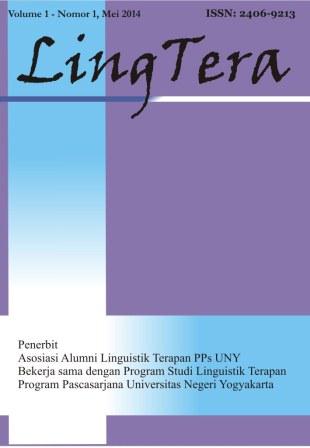THE FUNCTIONS OF IDIOMS WITH MAGICAL TERMINOLOGY IN BUILDING THE STORY OF J. K. ROWLING'S "HARRY POTTER AND THE ORDER OF THE PHOENIX"
DOI:
https://doi.org/10.21831/lt.v1i2.2595Abstract
This study describes the functions of idioms with magical terminology in Harry Potter and the Order of the Phoenix in building the story. This study analyzed the novel from the linguistics perspective. The idioms with magical terminology found in the novel were compared to real English idioms. Comparison was done word by word and also to the context of the story. The analysis was also done by comparing words' meaning and the semantic features. Finally the data were analyzed with related theories of linguistics and discourse analysis. The results of this study can be used as a consideration in teaching cultural relevancy in language teaching from the linguistic point of view in a novel.Keywords: functions of idioms, Harry Potter and the Order of the Phoenix, cultural relevancy in language teaching
Downloads
Published
2014-10-01
How to Cite
[1]
Fadhillah, H. and Bismoko, J. 2014. THE FUNCTIONS OF IDIOMS WITH MAGICAL TERMINOLOGY IN BUILDING THE STORY OF J. K. ROWLING’S "HARRY POTTER AND THE ORDER OF THE PHOENIX". LingTera. 1, 2 (Oct. 2014), 185–195. DOI:https://doi.org/10.21831/lt.v1i2.2595.
Issue
Section
Articles
License
LingTera allows readers to read, download, copy, distribute, print, search, or link to its articles' full texts and allows readers to use them for any other lawful purpose. The journal allows the author(s) to hold the copyright without restrictions. Finally, the journal allows the author(s) to retain publishing rights without restrictions.
- Authors are allowed to archive their submitted articles in an open-access repository.
- Authors are allowed to archive the final published article in an open-access repository with an acknowledgment of its initial publication in this journal.

Psychology, Evaluation, and Technology in Educational Research is licensed under a Creative Commons Attribution-ShareAlike 4.0 International License.
Based on a work at https://petier.org/index.php/PETIER.










